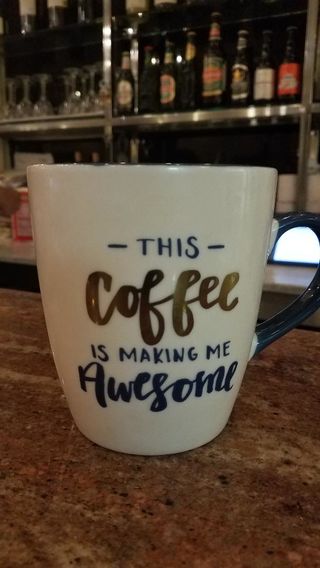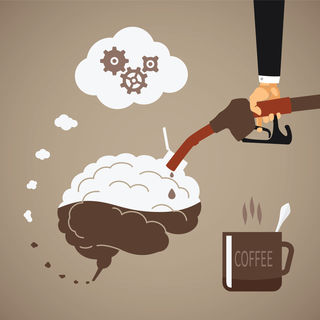Nootropics
Caffeine: It’s a Drink, It’s a Dessert, It’s a Drug
Caffeine vs Stimulant medications for ADHD: Which is better?
Posted July 30, 2018
“I believe humans get a lot done, not because we’re smart, but because we have thumbs so we can make coffee.” So says Flash Rosenberg, a visual artist, neatly encapsulating why we love to get caffeinated (she was probably holding a cup of coffee at the time). Who amongst us hasn’t struggled out of bed, dead to the world and devoid of energy - until we slurped our first glorious caffeinated sip of the day? We take a slug of Joe (or another caffeinated drink), our eyes open wide, and in short order we feel alert and ready to tackle the world. “Now I feel human again!” we may declare shortly after our morning liquid jolt. What’s going on here? Is caffeine a near-universal stimulant drug?

Well, most people do not think of caffeine as a drug, but (let us whisper this softly in your ear) – IT TOTALLY IS! Disguised in popular drink (coffee, tea, soda/pop) and food (chocolate, tiramisu, mocha ice cream) caffeine, even without considering closely-related alkaloid compounds (theophylline, theobromine) found in many of the same foods, is the most widely-used psychoactive drug in the world. It is an integrated part of nearly every culture and has probably been around for at least 5000 years. Lest you doubt that it is a drug, keep in mind that you probably notice the immediate effects of the caffeine in your cup more than you notice the immediate effects of prescription medicines you get from your doctor. That’s because the caffeine you ingest very rapidly affects your brain, heart, blood vessels, digestive tract, and lungs—generally making them all work faster and harder. For this reason, caffeine can be dangerous or even lethal if taken in high amounts (precipitating a heart attack in those with high blood pressure or heart disease, for example). And it is also highly addictive—once a person starts using caffeine regularly, they can’t stop without suffering unpleasant withdrawal symptoms (daytime sleepiness, fuzzy-headedness, headaches, stomach cramps, nausea…). That’s one reason why it is banned by some religions (Christian Scientists, Church of Latter Day Saints, etc).
The potentially dangerous and addictive qualities of caffeine are undeniable. If caffeine were not a socially-accepted food ingredient, and instead were a new medication that had to go through an approval process with the US Food and Drug Administration (FDA), it would come (if approved at all) with a long boldfaced list of potential side effects and ominous warnings: Caution! Addictive! May cause serious and even life threatening adverse reactions! Like other addictive medications it would be regulated in the US by the Drug Enforcement Administration (DEA). Medical providers wishing to prescribe it would have to go through a special registration and tracking process, just like with the stimulant medications used to treat ADHD. Prescription stimulant medications do carry warning labels and are tightly regulated by the DEA, and because of this many patients (and medical providers) are leery about their risk of causing addiction. In our offices, patients (or their concerned parents) often earnestly ask us about the risk of addiction and side-effects from ADHD medications—often while gently nursing a large cup of triple shot coffee.
In our experience, at the doses typically prescribed for ADHD, prescription stimulant medications are probably less addictive than caffeine—at least judging by our patient’s cravings. As a practical matter it’s much easier for our patients to quit or take a "drug-holiday" away from ADHD medications, compared to forgoing caffeine for even one single morning.
How are prescription stimulant medications and caffeine similar and how are they different?
Both caffeine and the prescription stimulant medications ultimately work, at least in part, by increasing the levels of two major neurotransmitters in the brain: norepinephrine and dopamine. It is, in part, the increase in these chemicals that lead to the positive effects of these drugs on attention and mental focus. It is also the effects on these brain chemicals, particularly dopamine, that makes them addictive. This being the case you may ask: Why do I need prescription medications for my ADHD? Why not just drink a lot of coffee all day long and forget about taking pills? Is the prescription of stimulant medications some kind of conspiracy between medical doctors and pharmaceutical companies?
While we understand why this is a tempting idea, in fact there are important differences between caffeine and the prescription stimulant medications, and these differences make caffeine a poor choice for ADHD. A big difference between caffeine and the prescription stimulants is the way in which they produce their effects: The prescription stimulant medications activate the norepinephrine and dopamine systems of your brain directly, and by doing so they fairly selectively increase mental focus. In contrast, caffeine’s direct target is actually an opposing chemical-receptor system in the brain—adenosine—whose primary function is to promote drowsiness. Caffeine prevents adenosine from activating its receptors and in this way directly blocks feelings of drowsiness. This is why caffeine is so effective at waking you up in the morning and at warding off unwelcome sleepiness during the day.

In contrast to the stimulant medications, the effects of caffeine on dopamine and norepinephrine in the brain are mostly indirect—caffeine activates these (and some other neurotransmitter systems) downstream of, or less strongly than, its effects on adenosine. The upshot of all this is that caffeine causes many more effects spread out over your whole body, compared to the prescription stimulant medications that more specifically target just the attention systems in your brain. Of course, caffeine does make you feel more awake, and it does help you focus mentally to some degree, but it also affects your mood and increases your heart rate, blood pressure, breathing rate, perspiration, digestive processes, and voluntary muscle movements. Caffeine’s broad systemic activity is what can lead to the “caffeine jitters” you’ve probably noticed if you’ve ever drank a bit too much of it. In fact, to get the same attention-focusing benefit from caffeine that you get from prescription stimulant medications, you’d have to drink so much that a lot of the benefit would be swamped out by very undesirable side effects—including irritability, anxiety, heart palpitations, and restlessness. That is NOT what you want in a medication intended to help you settle down and focus at school or a desk job!
The bottom line is that caffeine—while a tried-and-true, culturally-accepted, highly-effective boost to getting going in the morning and preventing unwanted sleepiness during the day—is a pretty poor choice for increasing mental focus. When used in moderation it is not without benefits on mental acuity, but its effects on attention aren’t nearly as targeted as the prescription stimulant medications - and it is a drug with unwanted side effects whether recognized as such or not. Moreover, it is at least as addictive (if not more addictive) than prescription alternatives for ADHD. You are not avoiding addiction by getting your daily (or is it hourly?) fix at the local café or office espresso machine instead of by filling a prescription at the local pharmacy. There are ways to improve mental focus without drugs - we're big advocates for that - but if you have ADHD and need to take something to improve attention and focus, our advice is to dump the cup and take a prescription ADHD medication!


